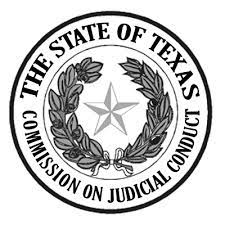 In the wake of the Obergefell ruling, a Waco justice of the peace refused to perform same-sex weddings but continued to perform heterosexual marriages. She gave an interview to local media to the effect that same-sex marriages violated her sincerely held religious beliefs. Subsequently, the State Commission on Judicial Conduct commenced an investigation of whether the JP’s actions violated the Texas Code of Judicial Conduct and Article V, Section 1-a(6)(A), which prohibits a judge from persistent or willful conduct that is clearly inconsistent with the judge’s public duties or casts public discredit upon the judiciary or the administration of justice. At the hearing, the JP contended that the Commission’s investigation violated her constitutionally-protected speech rights, as well as the Texas Religious Freedom Restoration Act (TRFRA). The Commission found that the JP violated Canon 4A(1), which prohibits extrajudicial conduct that would cast reasonable doubt on the judge’s ability to act impartially. The Commission subsequently issued a public warning.
In the wake of the Obergefell ruling, a Waco justice of the peace refused to perform same-sex weddings but continued to perform heterosexual marriages. She gave an interview to local media to the effect that same-sex marriages violated her sincerely held religious beliefs. Subsequently, the State Commission on Judicial Conduct commenced an investigation of whether the JP’s actions violated the Texas Code of Judicial Conduct and Article V, Section 1-a(6)(A), which prohibits a judge from persistent or willful conduct that is clearly inconsistent with the judge’s public duties or casts public discredit upon the judiciary or the administration of justice. At the hearing, the JP contended that the Commission’s investigation violated her constitutionally-protected speech rights, as well as the Texas Religious Freedom Restoration Act (TRFRA). The Commission found that the JP violated Canon 4A(1), which prohibits extrajudicial conduct that would cast reasonable doubt on the judge’s ability to act impartially. The Commission subsequently issued a public warning.
The JP sued the Commission seeking declaratory and injunctive relief, compensatory damages, and attorney’s fees under both the Uniform Declaratory Judgment Act and TRFRA. She alleged, among other things, that the JCC’s action “substantially burdened her free exercise of religion.” She also contested the JCC’s finding that her refusal to officiate same-sex weddings cast doubt on her impartiality as a judge. The JCC filed a plea to the jurisdiction and a plea in estoppel, arguing that the JP failed to utilize the exclusive statutory review process provided by the Legislature to challenge the JCC’s determination to issue a public warning and that her TRFRA claim failed because she did not comply with the statute’s notice requirements. The JCC further argued that sovereign immunity barred the JP’s claims because she failed to allege any ultra vires conduct. The trial court granted the plea to the jurisdiction and the JCC’s sovereign immunity claim. The JP appealed.
The court of appeals affirmed. With regard to the JP’s TRFRA claim, the court found that the JP failed to follow the proper statutory process to challenge the JCC’s determination—an appeal of the JCC’s decision. Instead, she sought to collaterally attack the JCC’s determination by way of a TRFRA claim. Her claim for injunctive relief likewise failed because the TRFRA provides that only a person who successfully asserts a claim or defense under the statute may obtain injunctive relief to prevent a threatened or future violation. Here the JP did not. With respect to the JP’s declaratory judgment claim based on the JCC’s finding that she violated Canon 4A of the Texas Rules of Judicial Conduct (impartiality), the court of appeals held that the Uniform Declaratory Judgment Act does not waive sovereign immunity for a challenge the Canons of the Texas Rules of Judicial Conduct. The trial court thus properly dismissed the JP’s claim on the basis of sovereign immunity.
Finally, the court of appeals rejected the JP’s assertion that the JCC acted ultra vires when it publicly reprimanded her, thus spurning her claim that the JCC’s action substantially burdened her free exercise of religion in violation of TRFRA. In order to have shown an ultra vires act, according to the court, the JP had to allege that the commissioners exercised their discretion in conflict with the constraints of the law authorizing them to act. Here the commissioners merely “carried out their duty to determine Hensley’s conduct violated Canon 4A and whether punishing that conduct with a Public Reprimand would substantially burden her free exercise of religion. Even if the JCC’s determination was erroneous, it would not constitute an ultra vires act because the commissioners were acting entirely within their statutory duties.
This is an interesting case for several reasons. First, if a determination of the Judicial Conduct Commission may be collaterally attacked or subject to an ultra vires claim as the plaintiff tried to do here, we might as well not have the Commission at all (the JCC is, after all, created by Art. V, § 1-a, Texas Constitution, not by statute). Second, if people who are elected to public office to do specific job refuse to do it based on their personal beliefs, especially judges, then they shouldn’t be in office in the first place. If you’re a JP, either perform weddings or don’t perform weddings: you can’t just pick and choose which responsibilities of the office you feel comfortable with and only do those. Third, judges are sworn to uphold the federal and state constitutions and laws. As far as we know, we still have supremacy clause until further notice. Judges can’t just set aside the laws they don’t like, whatever their objections might be. You’re either impartial or you’re not, but espousing personal beliefs, however sincerely held, that make you look biased in favor or against somebody is simply out of bounds. Stuff like that seeds doubt about the judiciary as a whole, not just about the particular judge involved. We appreciate the Austin Court of Appeals, without saying it directly, reaffirming this fundamental principle.












